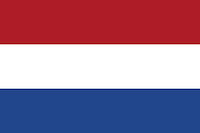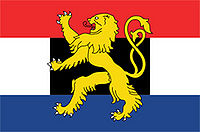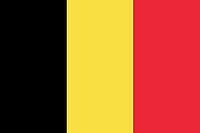History of the United Netherlands
Contents
The Low Countries
The Low Countries are located just west of the Germany above France. They include Luxembourg, Belgium, and the Netherlands. Only the latter two have been added to the game. Despite the fact that Low Countries have been involved in most of the wars throughout eHistory, they have rarely had a war on their own soil. The history documented on the wiki page for these countries is simple. We will begin with the Netherlands, then go on to Belgium. There will be parts in the histories of each country that are blank. These sections will be left blank because they deal with the union between the two countries, this will be covered in the “United Netherlands” section.
Netherlands
Early in its history, the Netherlands was part of the Mediterranean Alliance. However, they were disconnected from the rest of the alliance by a narrow strip of land owned by the United Kingdom. This area was Belgium who combined with the United Kingdom in the first official war ever in eRepublik. The Netherlands aided France and Italy in their invasion of Switzerland. With the eventual dissolution of the alliance, they joined the Peace Global Community in the midst of World War I. Their first official act as a member of the alliance they sent troops to help defend Hungary, who was submerged in war with Romania. They continued to help throughout the war.
From this point to World War Two not much happened on the military front pertaining to the nation, but much was going on in the political field. Through most of its history, the Netherlands had been run by a Center-Right Party named Iron and Wine. After four consecutive months of presidential rule, Iron and Wine finally fell to Socialistische Partij van het Volk, it would take four months of political struggle for Iron and Wine to finally regain its position. Ironically the Party which defeated them in the elections would only last one term, to be replaced by the Links Nederlands Party for the following three months. When it did finally reclaim the Presidency, it would either hold the Presidency, or the coalition along with the Libertarian Social Democrats almost uninterruptedly up to today.
On the wiki, it does not state that they were involved in World War two, however, this information is faulty. The Netherlands aided peace in World War two, in such fields as operation Burning Spirit which freed Germany, and the Belgian front, along with aiding its allies in various other battles. The War ended with the destruction of the ATLANTIS Alliance.
In Early 2009, the Netherlands plunged into a food crisis, all the stocks of food on the market were bought out, and people without food were left starving. However, the government acted on this, changing the taxes on it. The Crisis was solved rather quickly.
In Late March Spanish citizens in a group called “Las tropes Imperiales” moved to Belgium gaining a majority of the seats in their congress. In response to these political takeover actions, the president of Belgium yielded all territories to the Netherlands on the 5th of April 2009, during the presidential elections, thus began the United Netherlands. However, some Belgians fled the union for the United Kingdom.
The Union would prosper for many months, and more information about it can be found in the United Netherlands section. However in late January 2010, the union fell apart, and the Netherlands and Belgium once again became independent nations. The Netherlands continued as a member of Phoenix, and soon restored their war efforts in World War IV; they continue to help in the war even today.
Since its beginning, the Netherlands has been governed by “Coalitions,” though few records of these coalitions before the United Netherlands exist. In the Netherlands, the Government is made up of Congress Results rather than the ultimate executive rule. Coalitions are formed when the biggest party allies with other parties to form a coalition, which must have at least 50% of congress or more. However, in May 2010 this form of government was abolished and it has since turned to a Presidential Government ever since.
United Netherlands
On the 25th of March 2009, a Spanish Group called “Las Tropes Imperiales” took over the Belgian Congress enacting a PTO. In response to this, on April 5th, the Belgian President ceded all territories to the Netherlands in three battles of unification. These were the battle for Flanders, the battle for Wallonia, and the battle for Brussels. By the next day, the Union was complete, and the United Netherlands was born. Unlike other unions, the United Netherlands was recognized as a legitimate state by the Peace Global Community
Just before the outbreak of World War III, on June 23rd 2009, American Soldiers in Belgium started two Resistance Wars in Wallonia and Brussels, to “liberate” the nation. The Dutch and Belgian fought side by side along with their allies to stop the Americans. The plot to destroy the union failed. This attempt was called “Operation Belgian Waffle.”
The Unl fought in World War III providing aid to other PeaceGC Countries. After the collapse of PeaceGC, they immediately joined Phoenix, the successor alliance. On October 23rd (or 22nd) 2009, before the outbreak of World War IV, another plot to disband the Union was launched, “Operation Waffle.” The operation was initiated by a Romanian Group conveniently called “The Group” and was later aided by the American Seal Team Six. The initial objective of the operation was to “liberate” Belgium, or at least Flanders. Their true intent with Flanders is unknown, though there has been much speculation about it.
Flanders was taken, and the new Belgian Congress was now ruled by Romanians who held 60% of the seats. On November 5th Resistance wars in Brussels and Wallonia were started, there was heavy fighting but in the end, Brussels was lost. Many citizens began leaving Belgium for Wallonia. EDEN and Peace soldiers began flooding into the country to take the nation. However, the Presidency was secured by a member of The Group alex201, and the congress was also held by the Romanians for two months. Wallonia was able to cling on to the Unl for more than a month, when finally the United Kingdom stepped in and liberated the regions from The Group on December 15th and 16th. Since then the PTO groups have lost their influence and the regions have been turned over to a new independent Belgium. In its Final Days, the Unl were able to play their last role in world affairs, helping with the Phoenix efforts in World War IV.
Belgium
Through most of its history, Belgium hasn’t been independent but part of a union, or merger. From the first war ever fought in eRepublik history on the 10th April 2008, they lost their independence. The Belgium United Kingdom war was a quick war, it only lasted three days, and in fact, it wasn’t even a war at all but a merger between the two nations. However there was no official contract to support this claim, thus people began to riot and rebellion. The Merger lasted about a year, when Resistance Wars in Brussels began to tear away at it. By February 21st 2009, Belgium has completely regained its independence. However, this independence would only last one month.
On March 25th, the Spanish PTO group mentioned in both articles above forced the president to enter into a union with the Netherlands on April 5th. However, many Belgians didn’t support this union and fled to the United Kingdom. This union also lasted about a year, and was the center of many large conflicts, but this time their independence was brought about by a more sinister means. (I will not restate again what happened here, this is already a large enough block of text, info can be found in the first and fourth paragraphs of the United Netherlands Section)
Belgium now holds it’s independence since February 2010, though some still claim it isn’t a true state. However, Belgium has established a congress and presidency free from PTO groups, and has since joined the Entente. Though Belgium has had problems in the past with maintaining its independence, it has been able to hold onto it now for numerous months.
End of the Union
On October 22, 2009, a resistance war was started in the region of Flanders. The operation was carried out by the Romanian group, The Group, and the American SEAL Team 6. Despite some minor tanking on both sides, the RW could not be stopped and the region was taken. Several days after, a resistance was started in the region of Brussels; PEACE was unable to defend the region. On December 15, 2009 (Day 737) the UK attacked and conquered Flanders. A day after, Brussels was also conquered by the UK, effectively taking away all Belgian regions from the control of The Group. The Netherlands waited for their ally to hand over the Belgian regions, but for some reason that didn't happen. Belgian's were claiming their independence, although by rule, they never officially left the union as stated in the union treaty. In early 2010 unofficially the merger was no more after Belgium remained independent, and the Netherlands assumed they left the Union. After Belgium left the Union, the Netherlands kept the name United Netherlands and it's abbreviation UNL for over half a year. This to keep showing that the Netherlands was an open country for anyone in the world, and that the nation as always was united. The only remains of the United Netherlands were that they kept going to the same chat channel (#eUNL on rizon.net)


